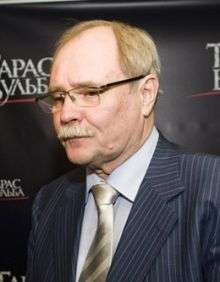Vladimir Bortko
| Vladimir Vladimirovich Bortko | |
|---|---|
 Vladimir Vladimirovich Bortko | |
| Born |
May 7, 1946 Moscow |
| Alma mater | Karpenko-Kary State University of Theatre, Film and Television |
| Occupation |
Director Screenwriter Producer |
Vladimir Vladimirovich Bortko PAR (Russian: Владимир Владимирович Бортко), born on May 7, 1946 in Moscow, is a Russian film director, screenwriter and producer.
Biography
Vladimir Bortko was born May 7, 1946 in Moscow. He grew up in the family of the Ukrainian Soviet playwright Aleksandr Korneychuk. After his studies in the Geological College in Kiev and his military service in 1965-1966, he worked three years as an electrical engineer in Kiev.
In 1969 he went to the Karpenko-Kary State University of Theatre, Film and Television in Kiev. After graduating in 1974 he worked as an assistant director at the Dovzhenko Film Studios. In 1975 he was directing his first film, entitled Channel.
In 1980, Vladimir Bortko became production leader in the Kinostudiya Lenfilm in Leningrad, the largest film production company of the Soviet Union after Mosfilm in Moscow. He received relative fame in the Soviet Union, but his big breakthrough he realized with the film adaptation of the novel Heart of a Dog written by the Russian author Mikhail Bulgakov. He was awarded it a Grand Prix at the Film Festival in Perugia.
In 1991 he made Afghan Breakdown, a film about the intervention of the Soviet Union in Afghanistan with the Italian actor Michele Placido. It was the first film in the newly created Russian Federation which approached the military activities of the Soviet Union critically.
After the turn of the century Vladimir Bortko accepted the challenge to realize two of the biggest projects ever in the history of Russian cinema for the television channel Telekanal Rossiya. The first was an adaptation of the novel The Idiot written by the Russian author Fyodor Dostoevsky into a television series of 10 episodes in 2002. The series clinched all the major television prizes in Russia, and actor Yevgeny Mironov received the award for Best Actor at the Monte Carlo Television Festival.
Three years later followed an adaptation of the novel The Master and Margarita written by Mikhail Bulgakov, also into a TV series of 10 episodes. The first broadcast of December 19, 2005 was preceded by months of controversy in the media. Opponents feared that by the filming, the layered narrative of the novel and the complexity of the socio-political and metaphysical themes would be sacrificed to the popular demands of the medium television. Bortko had been following carefully the dialogues of the novel though, and the series became the most successful ever on Russian television. On December 25, 2005 40 million Russians were watching the seventh episode.
In 2009, Bortko caused another big controversy, followed by a huge public success, with his film adaptation of the historical novel Taras Bulba written by the Russian author Nikolai Gogol. This time the criticism came from Ukraine, because while Bortko allowed the Polish actors in the film to speak Polish, the Ukrainian Cossacks had to express themselves in poor Russian. Yet this film was also a big success, with nearly 4 million paying visitors in Russian cinemas.
Bortko is a member of the Communist Party of the Russian Federation (CPRF), and has claimed that Russia now can only "export oil, gas and prostitutes."[1]
In March 2014 he signed a letter in support of the position of the President of Russia Vladimir Putin on Russian accession of Crimea.[2]
Major projects
Film and television
- 1974 – Doctor (thesis short film)
- 1975 – Channel
- 1984 – Without Family
- 1984 – The Blonde from around the Corner
- 1988 – Heart of a Dog
- 1991 – Afghan Breakdown
- 1998 – The Circus Burned Down, and the Clowns Have Gone
- 2000 – Gangsters of Saint Petersburg (TV series)
- 2002 – The Idiot (TV series)
- 2005 – The Master and Margarita (TV series)
- 2009 – Taras Bulba
- 2011 – Peter the Great: The Testament
Theatre
- 1993 – Oedipus Rex
- 2010 – Malleus Maleficarum
References
- ↑ "Communists pledge to stop 'dollar-lovers' experiment on Russia'". RT. 2011-09-24. Retrieved 2011-09-24.
- ↑ "Деятели культуры России — в поддержку позиции Президента по Украине и Крыму". Ministry for Culture of Russian Federation.
External links
- (English) Vladimir Bortko in the Internet Movie Data Base
- (English) Heart of a Dog in the Internet Movie Data Base
- (English) The Idiot in the Internet Movie Data Base
- (English) The Master and Margarita in the Internet Movie Data Base
- (English) Taras Bulba in the Internet Movie Data Base